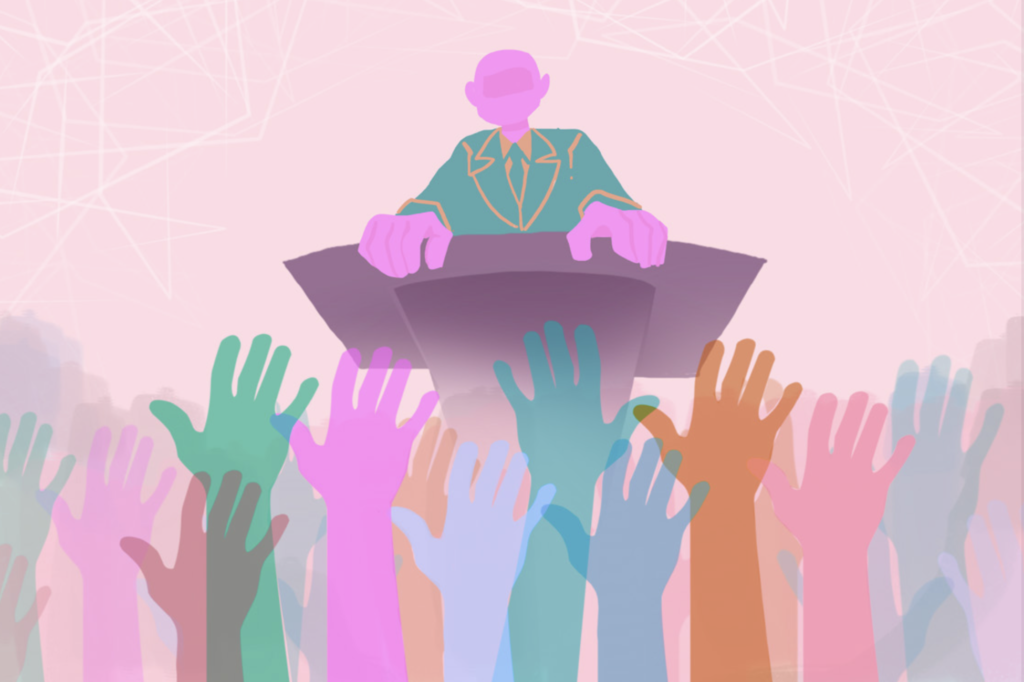
On Wednesday, February 22, I stood before my form, anxious to present my speech to over 100 people. I was prepared to convince them to choose me as their Student Council form representative, but, in that moment, I realized that I couldn’t say I knew all of them. I’m sure many of them could have said the same about me. While I am now my form’s president, the disconnect between myself and the student body uncovered a major flaw in the system in which I achieved victory: the lack of campaigning.
“There shall be no other form of campaigning or self-promotion (i.e. stickers, poster, buttons, self-promotional use of social media, etc.) outside of what is explicitly stated herein.” This statement lies in the Student Council’s constitution under the sections that lay out the election process for form representatives as well as the Student Council President and Vice President. According to Student Council President Amanda Benneh ’24, the purpose of this rule is to eliminate inequities in the running process as some candidates are able to afford more campaigning material than others.
Although this concern is entirely valid, I believe that there are many ways candidates can campaign that don’t cost any money, such as posting on social media, printing posters using Choate printers, or meeting students in person at various school events. Ultimately, I think this rule is too restrictive to the Student Council election process; candidates are barred from any form of self-promotion and, by extension, self-expression for their candidacy.
I firmly believe the ban on Student Council campaigning at Choate should be lifted. As it stands now, the election boils down to a popularity contest and a short speech. As long as someone is well-liked and is well-versed in the skills of “SPATE” (Stance, Projection, Articulation, Tone, Eye contact), they’ve won.
Candidates are not permitted to be more involved in the election process and are limited to a 90-second presentation. Lifting the ban on campaigning for Student Council would allow the candidates to better distinguish themselves and show their constituents why they are the best candidate.
The ban on campaigning also inhibits candidates from showing their dedication to being a member of the Student Council. Allowing candidates to invest more time into their campaign in different ways would give them a chance to demonstrate their commitment. We already see this sort of dedication in the posters made by Student Council President and Vice President candidates, which are sent to the School via email prior to the election. The student body can determine how devoted each candidate is by the quality and content of their poster. These also allow students to learn more about the candidates and consider how their traits and qualifications might make them a good president or vice president. Implementing these policies for all Student Council elections and expanding upon them would open doors for candidates to illustrate their dedication.
In the short speeches currently permitted, information conveyed about a candidate can be sparse; candidates need to decide whether they want to focus more on their qualifications, their character, or the policies they will implement.
Are they going to be able to fit in any jokes? Is it worth running the risk of going over the allotted time? Is it better to cut out parts of their speech so that the deans won’t walk up on stage and end it themselves? These are all questions candidates need to ask themselves when writing their speeches.
Of course, it’s critical to keep their speeches to only the most important parts, but, unfortunately, that limits the amount of information candidates are able to share with the student body. Lifting the ban on campaigning would solve this issue.
In addition, allowing students to campaign would even the playing field and make the election process more equitable. Currently, Student Council elections come down to a question of popularity rather than capability.
By giving candidates a chance to define themselves, we could move away from this incomprehensive election system. More often than not, new students who may be well-suited for the position struggle with becoming as well-known as returning students. I’m sure many of the new students in my class who ran for a post were required to do significantly more work to be recognized by their peers.
Right now, the Student Council election process is inadequate. It fails to let students show their devotion to the role, limits self-expression, and restricts their public perception to their popularity and a 90-second speech. Lifting the ban on Student Council campaigns would not only resolve these issues, but also allow for a more diverse election with a better-educated student body.




